After trolls, do comedians now have to worry about violent audience members leaping on stage? Gauging the context and leaving fear at the door should work fine, they say
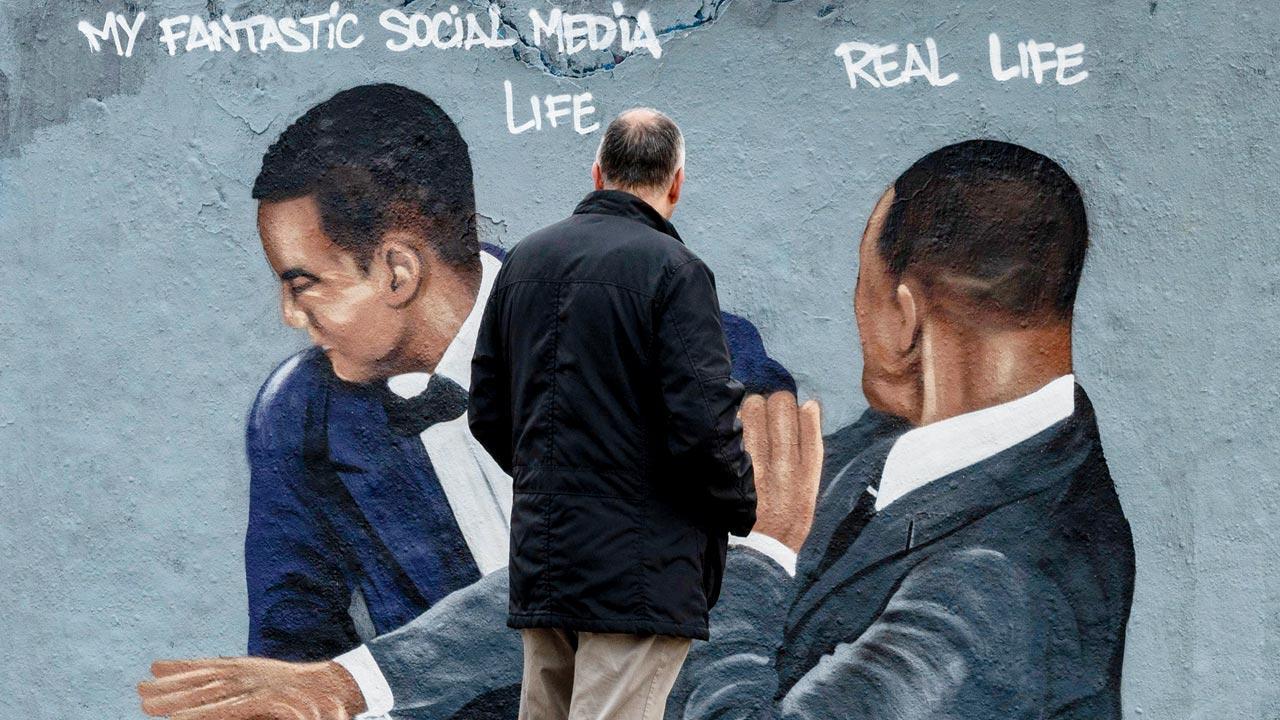
A man looks at a mural by Berlin-based street artist Eme Freethinker, featuring the likeness of Will Smith slapping Chris Rock during the Oscars ceremony. Pic/Getty Images
Last week started with a resounding bang. Will Smith, nominated for Best Actor at the 94th Academy Awards for his portrayal of Richard Williams, father to tennis legends Serena and Venus, had a moment where he chose violence. This happened in front of an erudite audience of Hollywood’s best, and 16.6 million viewers. Celebrated stand-up comic and actor Chris Rock cracked a joke about Smith’s wife Jada, who sporting a bald head and Jean Paul Gaultier ruffled skirt dress, looked smashing. He thought she could be the next GI Jane, given the clean pate. The audience cracked up, as did Smith, until he saw Jada’s straight face. Having struggled with alopecia, an auto immune condition that causes hair loss, she didn’t think it was funny. On an impulse, Smith swaggered onto stage—Rock egging him on in good humour—and gave him a whack. And then walked off, with just as much suave confidence, while Rock regaining his composure, a smile still on his face, said, “Wow, dude! It was a G.I. Jane joke!” Smith shouted, clearly audible despite no mic, asking Rock to keep his wife’s name out of his “f****** mouth”.
ADVERTISEMENT
While, unfortunately, this meant that audiences discussed one tight slap more than the biggest win of the night, what it did for standup comics across the world, is give them some mental fodder. Should Rock have made a dig at someone’s health? And how does a comic exactly set boundaries?
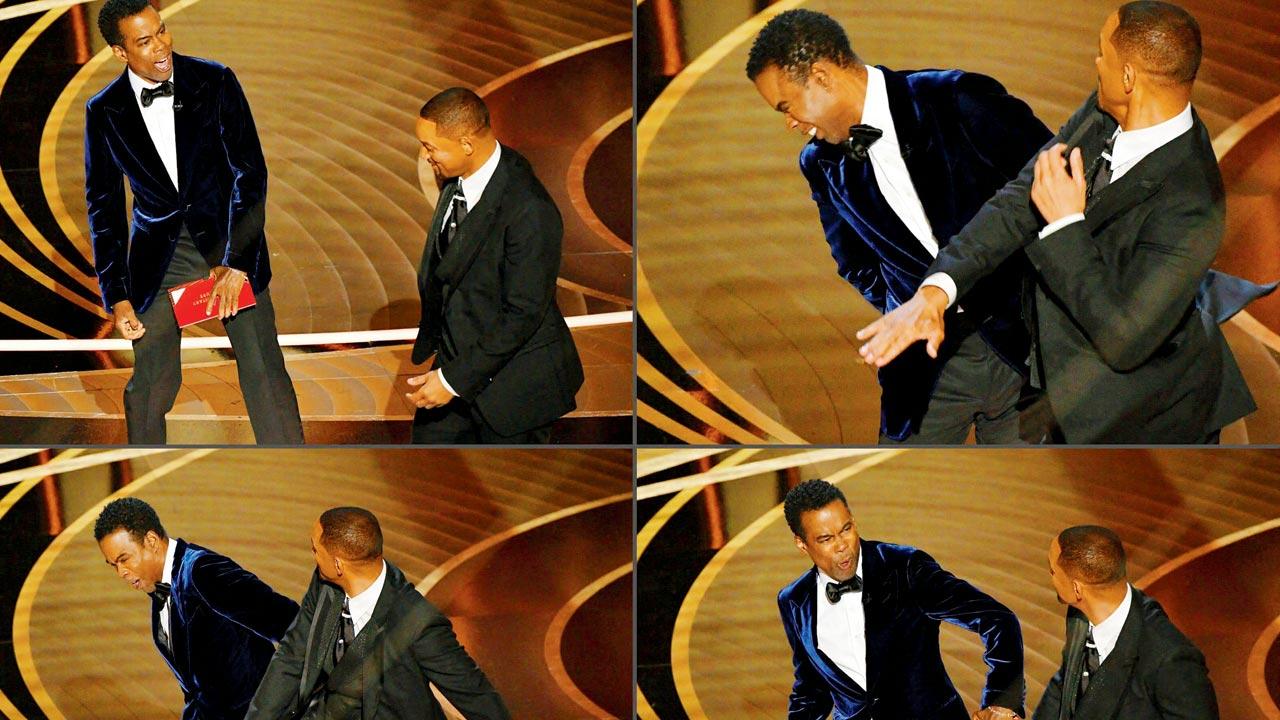
This combination of pictures show American actor Will Smith (right) approaching actor and standup Chris Rock on stage and slapping him during the 94th Academy Awards at the Dolby Theatre in Hollywood, California, on March 27. Pics/Getty Images
Often called the global face of Indian comedy, Delhi-based standup Papa CJ, has been at this 17 long years. Describing the mental process when he is writing a joke, he says he asks himself what the “intent” of the joke is. “Audiences sometimes don’t take note of the fact that offence has a lot to do with intent, and a comedian’s intention is almost always to entertain, not to offend.” The limit he won’t cross is causing hurt. Causing embarrassment, sure! “I have no problem teasing the audience in jest, but I’m careful not to be hurtful,” he says. The audience and setting also offer him cues. The brief before almost every corporate show is, keep it clean. “Religion and politics I don’t really talk about.” And then, there is the factor of the platform. “The danger is when you put up content from a live show on to the Internet, because after that, it is very easy for things said to be taken out of context.”
And of course, you learn and grow wiser over the years. CJ admits to having made mistakes characteristic of a novice; which he would never repeat. “If I’m performing at a corporate or personal event, it is my duty as a professional to respect the boundaries of the environment, and I will do so every single time. However, if you have come to a ticketed public show that has been advertised as having mature content, then I’ll do what appeals to my own sensibilities,” he explains, drawing a clear line.
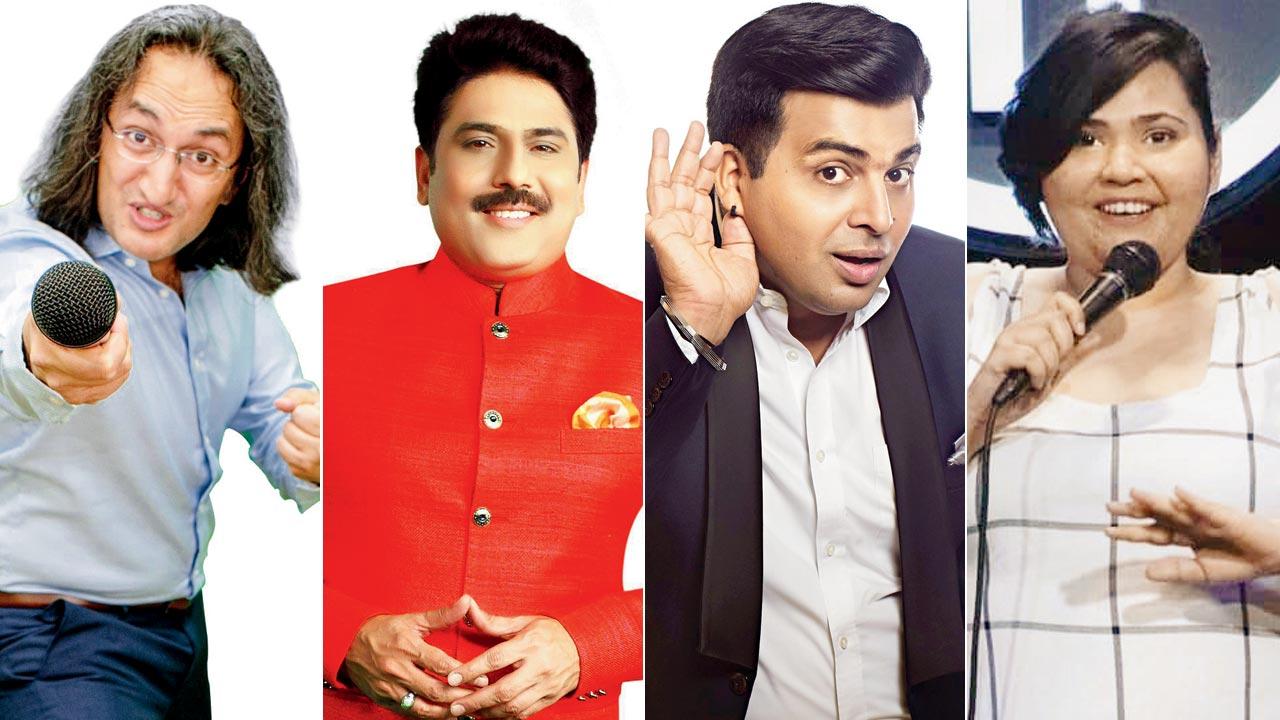 Longtime writer and performer Shailesh Lodha says he tries to remember the difference between hasya or comedy, and uphaas, which means to jeer; Veteran Papa CJ deliberates on what the intent of the joke is, and presents himself more freely if it’s a ticketed show rather than a sponsored corporate event; Amit Tandon and Aayushi Jagad
Longtime writer and performer Shailesh Lodha says he tries to remember the difference between hasya or comedy, and uphaas, which means to jeer; Veteran Papa CJ deliberates on what the intent of the joke is, and presents himself more freely if it’s a ticketed show rather than a sponsored corporate event; Amit Tandon and Aayushi Jagad
Comics, like all entertainers, are vulnerable to criticism. Mumbai comic Munawar Faruqui has all but given up performing after he was jailed for cracking a joke, which he claims, he didn’t by the way, and one that offended the right wing. One of India’s most successful comedy outfits, All India Bakchod (AIB) disintegrated after some members were accused in 2018’s #MeToo movement.
How then do comics plan their sets? Is it fear or popular opinion that drives their jokes? Mumbai-based comic Atul Khatri, who last received flak when during the Taliban takeover of Afghanistan—he referred to the country as “Af-gone-istan” on Twitter—says that a comic in India must be more careful than in others parts of the world, because it’s a new performing art on these shores. And the comic must build his or her following to take the audience along. “You can’t scare the audience away. Test your audience and adapt accordingly. That’s what I do. I address current issues, like say rising petrol prices, but with tact... ‘saanp bhi mare aur lathi bhi na toote’. For that, I should have enough knowledge [about comedy and the subject at hand] and be passionate about it.” Khatri echoes CJ’s view that the intent of every comic is only to make you laugh. Which is why a good comic doesn’t worry about the consequences.
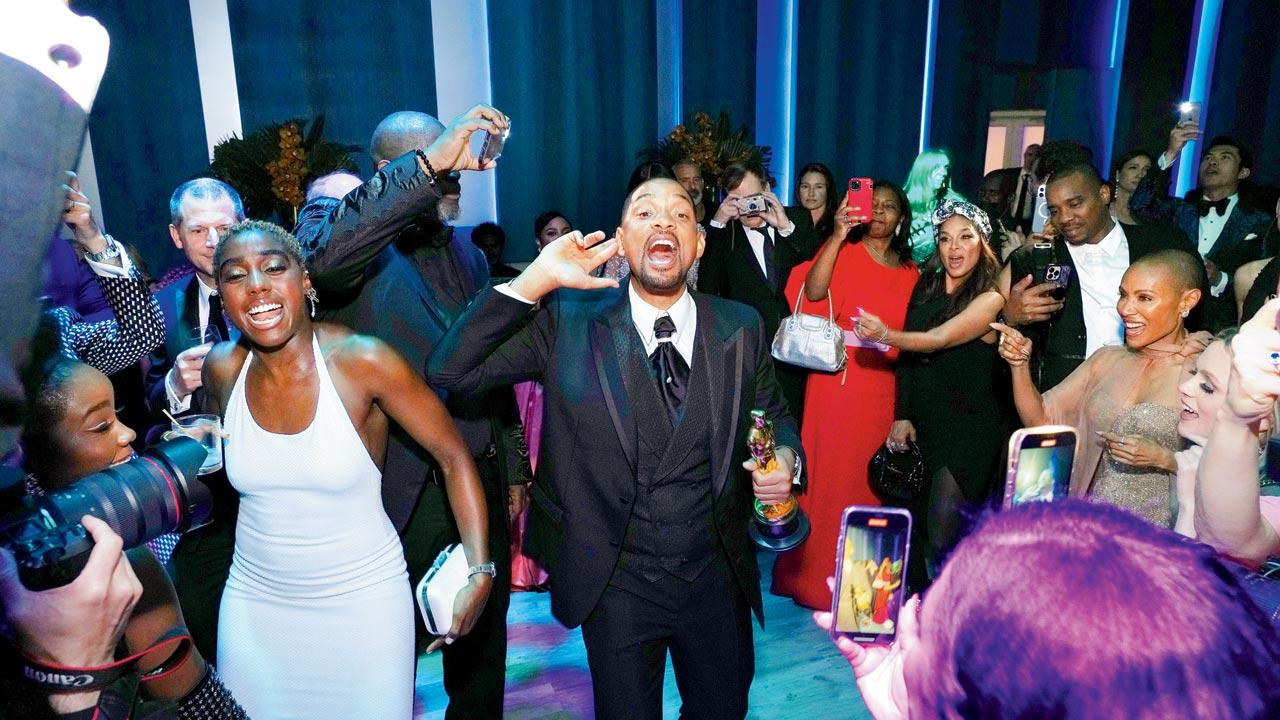 Smith and Jada Pinkett Smith (right) attended the 2022 Vanity Fair Oscar Party hosted by Radhika Jones at Wallis Annenberg Center for the Performing Arts right after the notorious awards ceremony, with no trace of the fracas that had unfolded on stage. Rock chose not to comment on the incident at all and was seen at Madonna’s manager Guy Hoseary’s after-party
Smith and Jada Pinkett Smith (right) attended the 2022 Vanity Fair Oscar Party hosted by Radhika Jones at Wallis Annenberg Center for the Performing Arts right after the notorious awards ceremony, with no trace of the fracas that had unfolded on stage. Rock chose not to comment on the incident at all and was seen at Madonna’s manager Guy Hoseary’s after-party
But there are those, who meticulously plan what they will say and steer clear of trouble. Amit Tandon, who performs in both Hindi and English, says that he wouldn’t have made the joke that Rock did, because it was about “punching someone down”. “But the reaction was also very unexpected. I would react to an outburst, politely. When you do that, a large part of the audience gets on your side, and realise you don’t mean bad. My rule is, ‘don’t punch down, always punch up’.”
When Smith got on stage an hour later, he apologised, but to the academy, not Rock. It took close to four days of image beating before an embarrassed Smith apologised to Rock for being “out of line”. He has since then resigned from the Academy of Motion Picture Arts and Sciences, and has said that he “will accept any further consequences the Board deems appropriate”. Rock, who refused to file charges, later that week said in Boston when he arrived for the Ego Death Tour, that “he didn’t want to talk about that s***”. After the awards, he is believed to have calmly carried on with his plans, joining Madonna’s manager Guy Hoseary’s after-party. It’s little wonder that Khatri says, “I just wish I had the presence of mind and composure that Rock displayed.” We are not sure if there are academies now that train aspirants in standup comedy and stage presence. What they don’t teach you though, is how to react to an unexpected, unwarranted action.
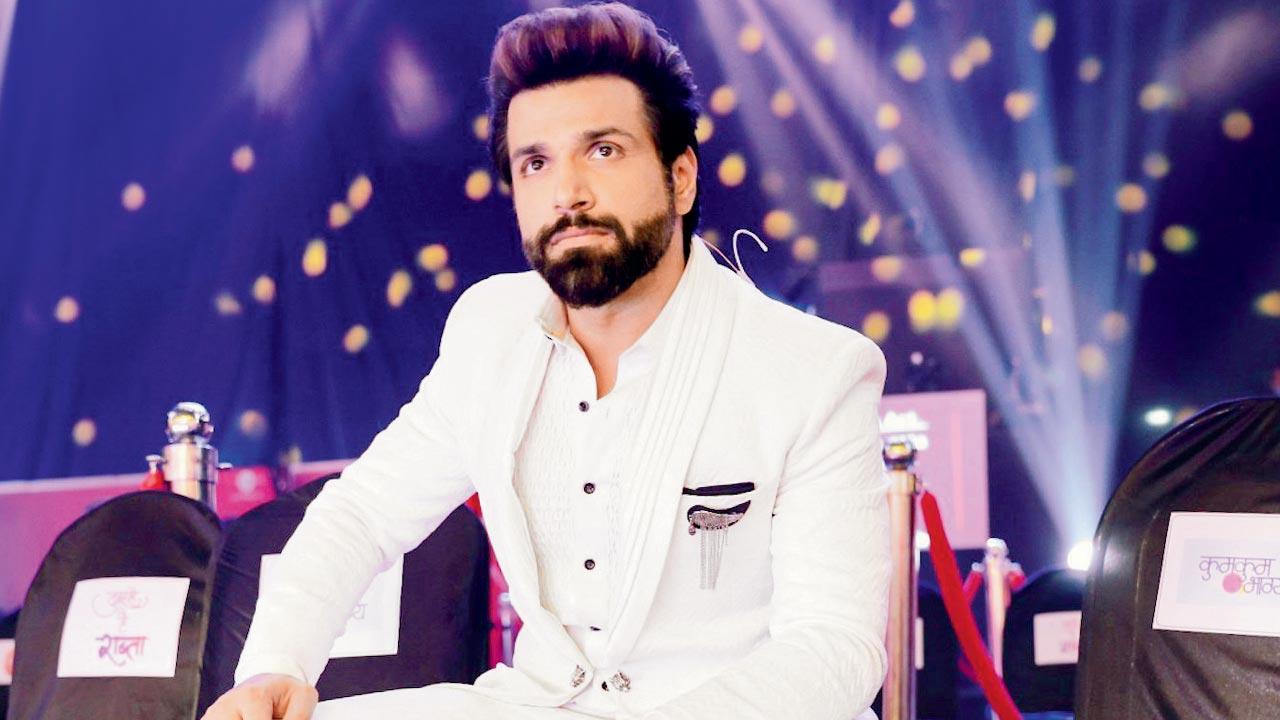 Rithvik Dhanjani
Rithvik Dhanjani
Marathi comic Sarang Sathaye, who is also the co-founder of BhaDiPa or Bharatiya Digital Party, a Marathi YouTube Channel, says that it boils down to figuring not what you say, but where you say it. “If I am a white person making a joke about black people, then I have to be in a room full of them, and set some context. For example, I do this set about deciding to not get married. In Pune, Marathis hold a traditional function called Sod Munja, which basically refers to giving up celibacy. I often joke that we gave it away a long time ago. Now, Puneris find it funny! Because they know the context. We [all comics] roast, but you have to find the person who won’t take offence. At a recent event, we roasted legendary actor Mohan Agashe, and he was such a sport! But, let’s say, I was performing at an event that celebrated his work and life, a sort of retrospective, those jokes would’ve been inappropriate.”
But what if you are only the performer, and not the creator of the joke? Who takes the blame, and do writer and performer share responsibility? Sathaye remembers the time when he was part of a play, and delivered a joke written by a scriptwriter. It had led to an audience member getting rather upset. “I broke the fourth wall, and said, ‘Oh, this means I am so convincing that you believed the joke!’ But I don’t know how would I have reacted if it was really something I had written.”
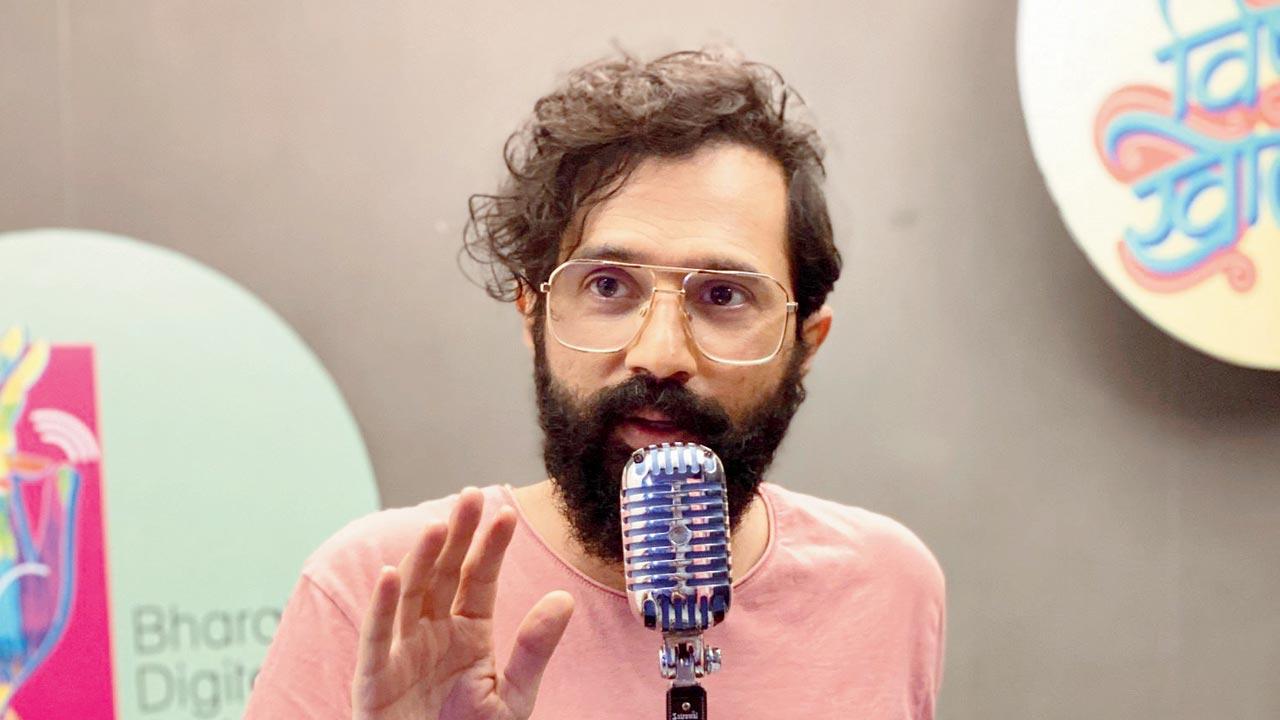 Marathi comic Sarang Sathaye, who is also the co-founder of BhaDiPa or Bharatiya Digital Party, a Marathi YouTube Channel, says that it boils down to figuring not what you say, but where you say it
Marathi comic Sarang Sathaye, who is also the co-founder of BhaDiPa or Bharatiya Digital Party, a Marathi YouTube Channel, says that it boils down to figuring not what you say, but where you say it
Aayushi Jagad is no stranger to reactions. In 2018, she was verbally abused and harassed by two unidentified men on a motorcycle in Pune for posting a video calling out AIB for the lack of female representation in their sketches. She has continued to be active, and free in her speech. Jagad says that deciding what goes into her set has a lot to do with her own moral compass. “I say things my conscience allows. Comedians are famously able to say the funnier line than the moral one, but I have yet to learn that skill. Nobody wants to hurt someone through the medium of a joke. It’s unfortunate that it happens at times, but the whole point of comedy is to induce joy. And if there is a chance that won’t happen, it leads to mental gymnastics because it weighs on you. But, it’s all a part of the process [of being a comic].” Is there a subject she will never touch? “My decision is usually dictated by my limited understanding of a situation. I personally don’t like to make a point while performing, but if it happens, great! I would like to think that I would stand up for myself if someone got abrasive. But in the past, when I was faced by a group of sleazy corporate executives, I decided to leave the venue as soon as I could. I did that because I felt differently in that moment than I do in my default setting of safe. I fled, in a sense. I decided to leave rather than solve the situation, which luckily, I was told is a perfectly normal response. So, that’s comforting.”
Khatri may have said that standup is new to India, but hasya vyang or satire has long been an Indian staple. Hasya kavis are known to hold sammelans that go on till the late hours of the night and where nothing is taboo. But as poet and actor Shailesh Lodha, who has been playing the lead role in Taarak Mehta Ka Oooltah Chashma since 2008, says, “Satire is also about the things you don’t say. Sometimes, in the hope of gaining extra laughs and claps, people cross the line. There is a difference between hasya, which means comedy, and uphaas, which means to jeer. Things can be said in a symbolic way. I usually resort to making fun of myself, or a relative like an uncle, or my father... it’s easier to insult that, and make people laugh.” Lodha, who has been a stage performer for 40 years, thinks that roasting is the worst thing that’s happened to comedy. “It is not humour... it’s cr**. We all are naughty, but this is far from sophisticated. Such humour is transient, it doesn’t live on.”
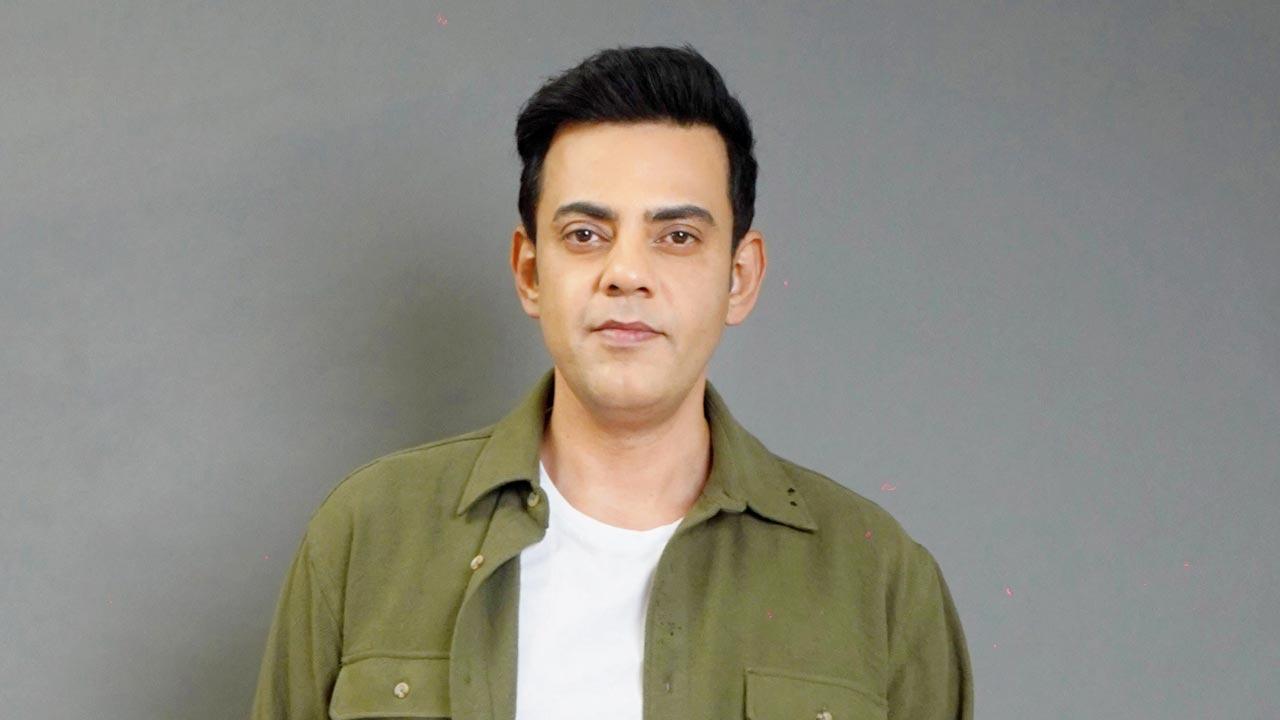 Cyrus Sahukar
Cyrus Sahukar
Like Rock, many standups double up as emcees and host prestigious live shows. Handling a room full of egos can be daunting, but many have done it well, and some have faced the music like Rock did. Hindi film director Ashutosh Gowariker once famously told director and host Sajid Khan to shut up during an award show held in 2008, even as Shah Rukh Khan and Ranveer Singh have got away with many a jibe. Actor and presenter Rithvik Dhanjani says that his usual stance when something goes wrong on stage is to accept. “Address the elephant in the room and make fun of how stupid you are. That helps lighten the mood. I would make the joke about myself. I will never be on stage and demean another. I hate taking a dig at someone’s personal life. Having said that, the way Chris reacted and handled the crisis, was done like a boss!”
Cyrus Sahukar, long-time funnyman, presenter and actor, says that like CJ, he first reads the room. At corporate events, there is always a set of dos and don’ts to follow, but at a personal public show he is headlining, he keeps fear out of the door. He can’t be worrying about being booed or accosted, he says. “You can’t be thinking about your audience too much, but yes, you do read the room. And in a room like the one at the Oscars, I feel that the reaction [to Rock’s joke] should have been more grown up. It’s toxic masculinity to think that you have to protect your woman. Rock showed more grace than anyone there.”
The Academy received serious flak for not reacting soon enough, not having Smith leave the room, and going ahead to hand the Best Actor gong to him, although, a few days later, in its statement, the Academy of Motion Picture Arts and Sciences said, “Mr Smith was asked to leave the ceremony and refused, [but] we also recognise we could have handled the situation differently.” The incident has organisers wondering what they’d do if someone from the audience darted to the stage and socked the performer in the face. Balraj Singh Ghai, founder of The Habitat, a performance space in Khar West, that hosts poetry and open mic nights, believes in fact, that the Academy reacted judiciously. “You can’t have knee-jerk reaction. You need to assess the situation. They did right,” says Ghai, who says he employs special security outside and inside the venue when controversial comics perform. But his experience has revealed that mostly, audiences get why they came for the show, and are understanding. “We get hecklers, yes, but they usually quieten down when the comic has a chat with them, addresses them from the stage. In this case though [Oscars], it’s the Internet that needs to calm down.”
One thing they’ll never joke about
Amit Tandon: Physical disability. Sickness. Or somebody’s financial status.
Papa CJ: Politics and religion. I am not well informed about either to make a joke. But I still can’t say that there is something I will never joke about. I just don’t want to be mean to anyone.
Why Will needs to meditate
“Anger, especially that which is unexpressed and not been dealt with in a healthy way, leads to tensions that are both physical and emotional. Underlying anger can lead to sudden outbursts which can be harmful to the individual reacting, and others too. When you experience negative emotions, you resort to unhealthy behaviour and try to provoke others as well. Angry energy can be highly destructive,” says Dr Roma Kumar, founding partner, Emotionally.In. “In order to lead a healthy life, don’t be envious of another. Instead, empower yourselves to become like the person you envy. Simply responding effectively and not reacting in a violent or negative manner is important. Some people have had success after practising meditation. Others have tried exercise. Take ownership of how you are feeling and express it so that people listen to you, instead of just hearing you.”
 Subscribe today by clicking the link and stay updated with the latest news!" Click here!
Subscribe today by clicking the link and stay updated with the latest news!" Click here!







